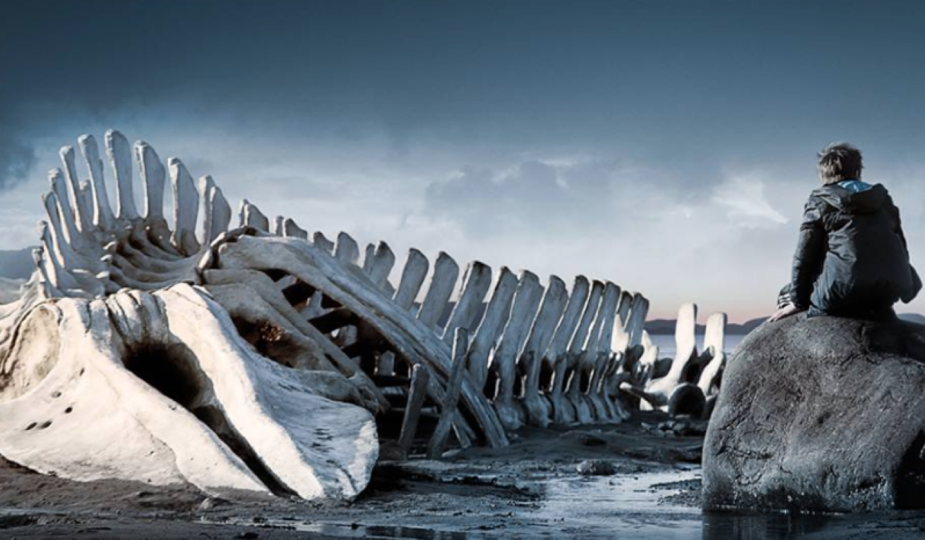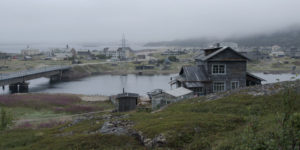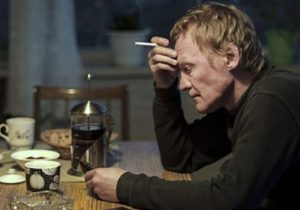
Leviathan (2014)
Director: Andrey Zvyagintsev
Andrey Zvyagintsev is one of Russia’s most fierce and unique contemporary directors. Through acclaimed films like The Return (2003), The Banishment (2007) and Elena (2001), he has used a series of blissful audiovisual and thematic ingredients: the movement of a camera that embraces an imposing stage, the role of nature and religion inside human catastrophes, as well as the complex combinations of abstract, political and philosophical concepts. Leviathan (2014) is a stunning story with great symbolic, mythological and brutal thematic force. Zvyagintsev achieves a masterful result dealing with the human condition and its greatness, but also its decadence. The mystical, religious and spiritual worlds come together as one.
 The story focuses on Kolya (Aleksey Serebryakov), a mechanic who lives with his beautiful young wife, Lilya (Elena Lyadova), and with his teenage son from his first wife, Romka (Sergey Pokhodaev), in an old and dilapidated house that has belonged to Kolya’s family for generations. The property is located at the foot of a mountain, surrounded by a privileged view of the Barents Sea.
The story focuses on Kolya (Aleksey Serebryakov), a mechanic who lives with his beautiful young wife, Lilya (Elena Lyadova), and with his teenage son from his first wife, Romka (Sergey Pokhodaev), in an old and dilapidated house that has belonged to Kolya’s family for generations. The property is located at the foot of a mountain, surrounded by a privileged view of the Barents Sea.
The vast place captures the attention of Vadim (Roman Madyanov), the mayor of the area. Vadim is an extremely corrupt and unscrupulous fellow that becomes obsessed with Kolya’s property. He issues a court order, forcing Kolya to sell him the house for a handful of rubles. Meanwhile, Dimitriy (Vladimir Vdovichenkov), Kolya’s friend from his days in the army, is now a lawyer in touch with influential circles in Moscow. He travels and tries to defend Kolya against the arbitrariness that the state wants to inflict on him. Dmitriy is a handsome man and self-confessed atheist who tolerates Kolya’s angry outbursts.
Dmitriy’s arrival convulses, for better and for worse, the heat of things in the region. Vadim (protected by the law and his bodyguards) acts like an untouchable semi-god; only the head of the Orthodox Church stands before him in the area’s hierarchy, which is why the mayor listens to his spiritual advice and offers gifts to the church. He won’t be intimidated by Dmitriy and will use everything in his power in order to get him out of the way and strip Kolya of his property.
The setting of the fought-over location is a remarkable achievement, since it represents a remote, mystical and lonely place that invites the viewer to reflect. The desolation of the landscape is at times overwhelming, and there’s also one special symbol that accompanies the beautiful photographic images: the enormous skeleton of an imposing oceanic animal, which we see repeatedly, as well as remains of stranded old ships.
Leviathan is a “colossal monster”, as read in both Genesis and the Old Testament Book of Job. “Discouragement spreads before him,” Job pointed out; “He is king over all the proud”. In the book of the same name written by Thomas Hobbes, Leviathan is a monster created by man in the form of a state, composed of the secular and the spiritual. The monster holds an absolute power, exercised severely to keep men from killing each other.
 Zvyagintsev’s film comprises these elements. His primary interest is to examine human relationships and the behavior of men under pressure. Throughout the story, Kolya is confronted with an oppressive, cold, and despotic system. It happens that from this particular struggle, a series of misfortunes begin to crush his relationships with family and friends. Not only the monster of state power, the loved ones are also those who end up hurting and betraying him.
Zvyagintsev’s film comprises these elements. His primary interest is to examine human relationships and the behavior of men under pressure. Throughout the story, Kolya is confronted with an oppressive, cold, and despotic system. It happens that from this particular struggle, a series of misfortunes begin to crush his relationships with family and friends. Not only the monster of state power, the loved ones are also those who end up hurting and betraying him.
Zvyagintsev transports the viewer through the cells of different scenarios: the interior of the protagonist’s house, in which the concepts of the domestic and the familiar are fused with claustrophobia, the endless landscapes that constantly refer to an insignificance of the human in front of nature; the threatening sea from which some kind of beast seems about to emerge; the administration offices, with that aftertaste of Kafka’s The Trial; then the obscure chambers of the orthodox priest, in which the earthly and the divine are condensed in the form of luxury. Each landscape, natural or human, determines a type of scene and seems to condition its characters, forcing them to develop a specific behavior. Each individuality is pushed by the weight of the social structure and the collective history.
In Franz Kafka’s words: “One must lie low, no matter how much it went against the grain, and try to understand that this great organization remained, so to speak, in a state of delicate balance, and that if someone took it upon himself to alter the dispositions of things around him, he ran the risk of losing his footing and falling to destruction, while the organization would simply right itself by some compensating reaction in another part of its machinery – since everything interlocked – and remain unchanged, unless, indeed, which was very probable, it became still more rigid, more vigilant, severer, and more ruthless.”
by Octavio Carbajal González

I read a review of Leviathan as it was released but for some inexplicable reason I never got to see it. I’ve read your review a few times and I realized that this is a movie not to be missed. You talk about plot, themes and characters with nuance. as well as the technical aspects which take the film into the “great” category.
The modern Russian tragic hero and all his implications. Can’t wait to watch this movie.
Your pre-perspective is invaluable Octavio.
I was pleasantly surprised by your review, love the website
Hi Octavio
What a great review of this powerful and bold movie. One really has to be in the right frame of mind to ‘enjoy’ viewing this disturbing tale. I love how you always manage to encourage discussion of the movie reviewed. Keep it up!
Always a pleasure to read your comments, Serge. Thanks for following my reviews throughout this time.
I’m glad to see diversity of opinions inside my articles. The themes of this film are familiar to me. Corruption has been the cancer of my country, and there’s a lot of people that suffer the injustices of Kolya’s life.
I never saw this film as a denouncement or portrayal of an specific country, this things can happen in any country, at any time.
I’ll keep up the good work!.
It is happening all over the world. The best case example right now would be the US.
We in Australia haven’t seen the worst of it but it exists under the surface.
Take care my friend!
I am honest, this film didn’t work 100% with me. There were some parts that I liked a lot and you pointed them out- the stunning location of the house, cinematography, and the depiction of kafkaesk bureaucracy, a corrupt cleric class and legislative apparatus (those female state attorneys reading out the case in monotonous double-speed ), and the inevitable despair and defeat those elements bring to the individual who is caught in their maelstrom.
), and the inevitable despair and defeat those elements bring to the individual who is caught in their maelstrom.
But!
I first was amused by the way all people- men and women- were tanking vodka from waking up until they go to bed again, until I was annoyed by it. Such a cliché!
Then the plot line of his friend suddenly banging Kolya’s wife so that they are driven apart is so weak, especially since there is no visible attraction or back story given. The female lead left me completely cold in general, shich os a problem considering the end… Personally, I wish the film had done without the sexodrama just like Kafka did, and focused on the incomprehensible socio-bureaucratic powers- when it did that it was strong.
I guess the point was to depict complete, endless misery with no happy end, and you know what – I have to adjust myself : that happens, an endless downward spiral with stunning, tragic things revealing themselves endlessly. And therefore alone the film is absolutely valid and you close your review perfectly with Kafka.
As you may know, the film’s main core depicts a ruthless portrait of the decomposition that grows inside an environment dominated by corruption, arrogance, ambition and violence.
The subplots aren’t the strongest point here (I’m glad you mention it). Leviathan works at it’s main core, where the “Kafkaesque” situations appear.
There’s one particular scene that stuck with me: Kolya and his fellows organize a shooting competition on a picnic, using framed photographs of Lenin, Stalin, Khrushchev, Brezhnev and even Gorbachev. It is what it is- the rage of men against their “leaders”. If someone is interested in history, there’s huge lessons behind these names.
Also, I must add: senior officials from Vladimir Putin’s administration and representatives of the Orthodox Church have assured that this is an “anti-Russian” film.
Zvyagintsev did a marvelous job on combining these core topics with the concept of “Leviathan”.
I wouldn’t call it anti-Russian, but almost all Russians in the film are depicted as strong alcoholics and losers, all living in hell and tristesse, and that’s simply not true.
The picnic scene is a good example. They symbolically shoot all these old portraits – but where do these men stand? Are they democrats, communists, Neo-Nazis…? Who knows, because the film fails to frame them. If this was an American film, people with such lives and hobbies – driving out to have a very loveless barbeque, shooting around while drinking countless bottles of vodka in plastic cups- would be labeled as white trash / hillbillies/ retarded. But in Leviathan’s case we tend to think: “This is Russia, humble and normal people in Russia, how horrible,” and amplify that thought with Oscar nominations. So yes, I understand the critique and objections.
Hi Octavio, really fascinating review again and I’m happy that you chose this film of Andrei Zvjagintsev. I enjoyed to read your point of views abouth the film. He is masterful director. The music from the opera ”Akhnaten” by Philip Glass suites very well into this film.
Hey Mika !,
Thanks for your kind words, you´ve been following my reviews for a long time, I truly appreciate it.
Zvyagintsev is an enormous talent, we must keep an eye on what he does next. The magnificent “Akhnaten” puts you directly into Russia´s oppresive north shore… Still gives me chills !.
Great film and review, thanks for the clarification on JOB. The inspiration for this story was actually something that happened in the USA – this is described in the trivia section. Look up Marvin Heemeyer, Grand Lake, Colorado, USA.
It could happen anywhere, just change a few details of who/what/how/why.
Thanks for your comment, Chris.
This is a film that speaks about universal corruption & its consequences. I was aware of the inspiration for the story, and I completely agree with you. It can happen anywhere. The Leviathan is everywhere.
Octavio,
I watched this film several years ago but I felt rather detached from the characters and plot. I now plan to revisit with new eyes and a new mind after reading your detailed, multilayered review.
I hope you enjoy it, Mark. This is a universe that produces both discomfort and grief. There aren´t rays of sunshine here, this is tragic and necessary.
Beautifully written article about a most interesting film. The scope of the film is (almost) impenetrable and you have done a great job opening the film up. They should put your review on the BlueRay release of the film. A rewarding but difficult film. Your review/ overview is required reading.
Thank you for reading, Shawn.
I struggled a bit with this review, it wasn’t easy to capture the undertones and constant symbologies, I’m glad you liked it. If this review came with the Bluray= perfect release.
Above its own role of social denunciation, “Leviathan” is a truly remarkable showcase of human relationships: love, truth, friendship and power.
The monster is constantly moving under the surface, slowly waiting to emerge in our lives. We must be prepared to face him.
Great review! One of the best films I’ve seen to date, precisely because of its ambivalence.
I have never seen such a nuanced confrontation with a “people’s soul” in a film, I really don’t know anything like it. If you want to understand Russia, you must see this film.
I´ve always felt deeply intrigued by Russia´s history. The country´s events forged strong ideologies around the world. Russians have geniuses in every field of art.
The film´s ambivalence takes us through the origins and progress of this mysterious part of the world.
Impressive and depressive movie. The film left me a little disturbed because the residents there seem to endure all the misery only with a lot of vodka. The landscapes are sometimes grandiose, but often also bathed in an oppressive gray. Left me depressed.
Agree with you, Markus. The film has a feeling of expansiveness. The impressive views of Russia’s north shore are bathed with the colossal trouble of the main characters. Vodka eases the community’s pain.
Epic movie.
Great word to describe it!